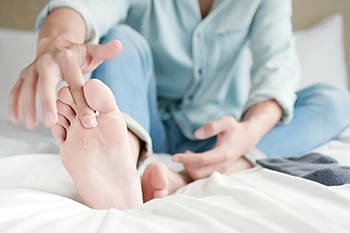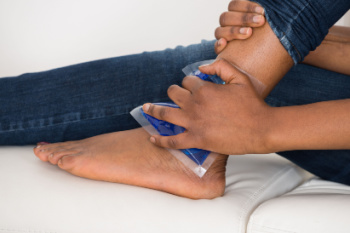
Athlete’s foot is a fungal infection that causes itching, redness, and peeling, usually between the toes or on the soles. Most cases respond well to mild antifungal creams, sprays, or powders. However, if symptoms continue for weeks or return often, the infection may be more serious or resistant to treatment. In some cases, what looks like athlete’s foot may be another condition, such as eczema or psoriasis, and needs a different approach. Poor foot hygiene, wearing tight shoes, and damp environments can also make healing harder. A podiatrist can confirm the diagnosis through a simple test and may prescribe stronger medications or check for other skin problems. Early attention can prevent the infection from spreading or becoming chronic. If you have athlete’s foot that does not improve, it is suggested that you see a podiatrist for a proper diagnosis and appropriate treatment.
Athlete’s foot is an inconvenient condition that can be easily reduced with the proper treatment. If you have any concerns about your feet and ankles, contact Dr. Kendall Blackwell from InStride Wilson Podiatry Associates. Our doctor will treat your foot and ankle needs.
Athlete’s Foot: The Sole Story
Athlete's foot, also known as tinea pedis, can be an extremely contagious foot infection. It is commonly contracted in public changing areas and bathrooms, dormitory style living quarters, around locker rooms and public swimming pools, or anywhere your feet often come into contact with other people.
Solutions to Combat Athlete’s Foot
- Hydrate your feet by using lotion
- Exfoliate
- Buff off nails
- Use of anti-fungal products
- Examine your feet and visit your doctor if any suspicious blisters or cuts develop
Athlete’s foot can cause many irritating symptoms such as dry and flaking skin, itching, and redness. Some more severe symptoms can include bleeding and cracked skin, intense itching and burning, and even pain when walking. In the worst cases, Athlete’s foot can cause blistering as well. Speak to your podiatrist for a better understanding of the different causes of Athlete’s foot, as well as help in determining which treatment options are best for you.
If you have any questions please feel free to contact our office located in Wilson, NC . We offer the newest diagnostic and treatment technologies for all your foot and ankle needs.

Experiencing sudden foot pain while walking can be alarming and may result from several conditions. Plantar fasciitis is a common cause, involving inflammation of the tissue that supports the arch, leading to sharp pain in the heel or sole. Calluses, which develop from friction and pressure, can create discomfort with each step. Metatarsalgia, a condition affecting the ball of the foot, causes aching or burning pain due to excessive stress on the metatarsal bones. Morton's neuroma, a thickening of tissue around a nerve between the toes, can result in a sharp, tingling sensation. Wearing supportive footwear, using cushioned insoles, and avoiding excessive pressure can help manage symptoms. If you have persistent or worsening pain, it is suggested that you visit a podiatrist who can determine what the cause is, and offer appropriate treatment solutions.
Foot Pain
Foot pain can be extremely painful and debilitating. If you have a foot pain, consult with Dr. Kendall Blackwell from InStride Wilson Podiatry Associates. Our doctor will assess your condition and provide you with quality foot and ankle treatment.
Causes
Foot pain is a very broad condition that could be caused by one or more ailments. The most common include:
- Bunions
- Hammertoes
- Plantar Fasciitis
- Bone Spurs
- Corns
- Tarsal Tunnel Syndrome
- Ingrown Toenails
- Arthritis (such as Gout, Rheumatoid, and Osteoarthritis)
- Flat Feet
- Injury (from stress fractures, broken toe, foot, ankle, Achilles tendon ruptures, and sprains)
- And more
Diagnosis
To figure out the cause of foot pain, podiatrists utilize several different methods. This can range from simple visual inspections and sensation tests to X-rays and MRI scans. Prior medical history, family medical history, and any recent physical traumatic events will all be taken into consideration for a proper diagnosis.
Treatment
Treatment depends upon the cause of the foot pain. Whether it is resting, staying off the foot, or having surgery; podiatrists have a number of treatment options available for foot pain.
If you have any questions, please feel free to contact our office located in Wilson, NC . We offer the newest diagnostic and treatment technologies for all your foot care needs.

Ongoing ankle pain can limit your mobility and affect your quality of life. Whether it stems from a past injury, arthritis, or an underlying condition, chronic ankle pain deserves careful evaluation and treatment. Diagnosis begins with a thorough history and physical exam. A podiatrist will assess your ankle’s range of motion, stability, and areas of tenderness. Imaging studies, like X-rays, an MRI scan, or an ultrasound, often help identify issues such as ligament damage, arthritis, or cartilage injuries. Sometimes, chronic pain results from old sprains that have never fully healed or conditions like tendonitis or nerve entrapment. Treatment depends on the cause. Non-surgical options may include targeted exercises to strengthen and stabilize the joint, custom orthotics, bracing, or injections to reduce inflammation. In more severe cases, surgery may be considered to repair damaged structures or correct alignment issues. If ankle pain is interfering with your life, it is suggested that you schedule an appointment with a podiatrist for a thorough evaluation and customized treatment plan.
Ankle pain can be caused by a number of problems and may be potentially serious. If you have ankle pain, consult with Dr. Kendall Blackwell from InStride Wilson Podiatry Associates. Our doctor will assess your condition and provide you with quality foot and ankle treatment.
Ankle pain is any condition that causes pain in the ankle. Due to the fact that the ankle consists of tendons, muscles, bones, and ligaments, ankle pain can come from a number of different conditions.
Causes
The most common causes of ankle pain include:
- Types of arthritis (rheumatoid, osteoarthritis, and gout)
- Ankle sprains
- Broken ankles
- Achilles tendonitis
- Achilles tendon rupture
- Stress fractures
- Bursitis
- Tarsal tunnel syndrome
- Plantar fasciitis
Symptoms
Symptoms of ankle injury vary based upon the condition. Pain may include general pain and discomfort, swelling, aching, redness, bruising, burning or stabbing sensations, and/or loss of sensation.
Diagnosis
Due to the wide variety of potential causes of ankle pain, podiatrists will utilize a number of different methods to properly diagnose ankle pain. This can include asking for personal and family medical histories and of any recent injuries. Further diagnosis may include sensation tests, a physical examination, and potentially x-rays or other imaging tests.
Treatment
Just as the range of causes varies widely, so do treatments. Some more common treatments are rest, ice packs, keeping pressure off the foot, orthotics and braces, medication for inflammation and pain, and surgery.
If you have any questions, please feel free to contact our office located in Wilson, NC . We offer the newest diagnostic and treatment technologies for all your foot care needs.

